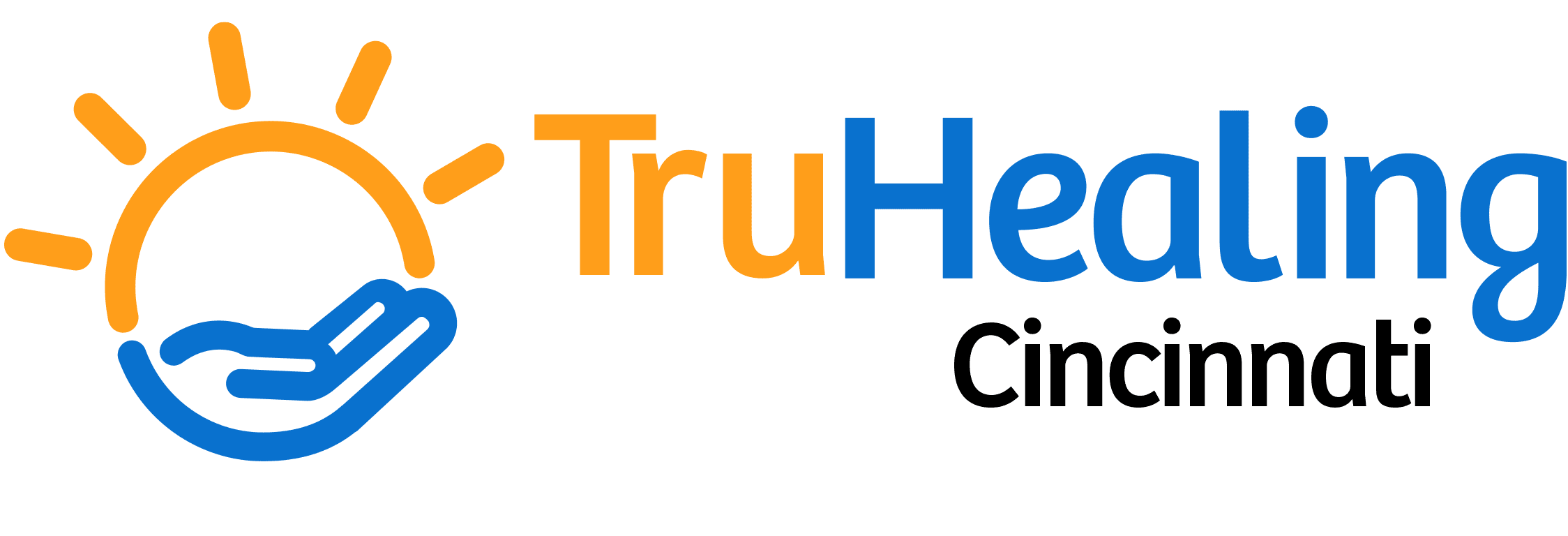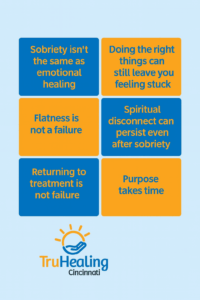Sobriety Isn’t the Finish Line You Thought It Would Be
If you’re reading this, you’ve probably done the hard thing—maybe more than once. You got clean. You went to treatment. You did the group work, the journaling, the early mornings and the hard goodbyes. Maybe you’ve stacked up months, even years, without using. And still… something’s off.
You don’t feel broken. You’re not actively spiraling. But you’re not okay either. There’s a kind of quiet stuckness that’s settled in. A flatness. Maybe even a loneliness that snuck in when the structure faded and life resumed.
That’s what no one tells you about drug addiction treatment. Getting clean is only the beginning. The rest—staying well, staying connected, staying alive in every sense of the word—that’s the real work. And sometimes, that work gets quiet and weird and hard to name.
At TruHealing Cincinnati, we hear from long-term alumni all the time who feel exactly like this. You’re not failing. You’re evolving. And you don’t have to do this part alone either.
1. Sobriety Isn’t the Same as Emotional Healing
Addiction treatment teaches you how to stop using. But it doesn’t always teach you how to reconnect—to your body, your joy, your relationships, your story.
You may have learned how to sit through a craving, how to say no, how to identify your triggers. But what about what comes after? What about when the cravings fade and you’re still left feeling flat? That’s not a relapse risk—that’s a relational gap. You might be sober, but not yet whole.
That’s okay. Wholeness takes time. And sometimes, it takes going deeper than the first round of treatment allowed.
2. “Doing the Right Things” Can Still Leave You Feeling Stuck
Recovery milestones can start to feel like boxes to check. Meetings? Done. Step work? Done. Sponsor? Check. Service work? Ongoing. Gratitude list? Got it.
And yet, something inside you might still feel… gray.
Here’s what we want you to know: doing the “right things” doesn’t guarantee emotional connection. If you’re doing the motions but not feeling the meaning, that’s not a failure. It’s a sign your inner world is asking for a new kind of attention.
It might be time to explore deeper therapy. Try body-based work. Re-engage in a community that meets the version of you that exists now—not the one who walked in years ago.
3. Flatness Isn’t a Sign You’re Doing Something Wrong
You might feel numb and wonder, Shouldn’t I be more grateful?
Flatness isn’t ingratitude. It’s a signal that you’re ready for more. More connection. More purpose. More truth.
And if you’re feeling too tired to chase those things, that’s part of the signal too. Flatness is fatigue with no story. We want to help you find that story again.
If you’re looking for drug addiction treatment in Lexington, Kentucky that supports alumni like you, our Cincinnati-based team can help you reconnect without going back to the beginning.
4. You Might Be Spiritually Disconnected—Even If You “Believe”
Many long-term clients have some version of this whisper: I got sober, but I still feel far from myself.
That might be a spiritual disconnect, not a behavioral one. Maybe you still pray, meditate, or go to church—but your insides feel far away. That’s not about belief. It’s about emotional contact.
And no, you don’t have to call it “God” to come home to yourself.
Sometimes it means trauma is still running in the background. Sometimes it means you’ve outgrown the container you were first given. Sometimes it means you’re lonely—and not the kind a step meeting fixes.
5. Treatment Isn’t One and Done
A lot of people think coming back to treatment means relapse. That’s not always true.
Returning to structured support isn’t failure. It’s fluency. You’re listening to your needs instead of white-knuckling through them. Maybe it’s time for an alumni group. A therapeutic intensive. A weekend of silence and honesty with someone trained to help you peel back another layer.
You don’t need to crash to ask for help. You just need to notice the silence and be curious enough to answer it.
If you’re looking for drug addiction treatment in Springfield, Ohio, or near Cincinnati, know that we welcome alumni not with a diagnosis—but with open, steady space.
6. Purpose Isn’t a Lightbulb—It’s a Slow Return
You might expect some moment where everything makes sense again. But often, purpose isn’t an epiphany. It’s what happens when you do one thing that feels honest, then another.
Maybe it’s volunteering in a way that feels alive again. Maybe it’s telling your story in a room where you’re not the example—they are. Maybe it’s starting therapy for something you didn’t touch the first time around.
Purpose grows quietly when you stay close to what matters. And yes, sometimes that’s hard to do without help.
7. You’re Not Alone—Even If It Feels Like It
Flatness breeds isolation. It’s easier to disappear when you’re not in crisis and not in celebration. That’s why this stage of recovery is so slippery—it doesn’t scream.
But you don’t have to wait to scream to be seen.
We built our alumni care offerings for this exact season. Because sometimes “after” is when you need the most care.
Frequently Asked Questions
Is it normal to feel emotionally numb after years of sobriety?
Yes. Emotional flatness is more common than most alumni realize. It doesn’t mean you’re ungrateful or regressing—it often signals the need for deeper emotional or spiritual work.
What kind of treatment is available for long-term alumni?
Alumni care can include outpatient therapy, alumni groups, trauma intensives, or even short-term return to IOP. At TruHealing Cincinnati, we meet you where you are—not where you started.
Do I need to relapse to come back to treatment?
Absolutely not. Many people return for support before a relapse ever happens. Treatment isn’t a punishment—it’s a support system. You’re allowed to re-engage simply because something inside you is asking for help.
How do I know if I need more than meetings?
If you’re attending regularly but still feeling disconnected, numb, or like you’re just going through the motions, that’s a sign that deeper clinical or emotional support could help.
Can I work with a therapist even if I’ve been sober for years?
Yes. In fact, long-term sobriety often brings up new layers of trauma, grief, or identity that weren’t safe to explore early on. Therapy can help you navigate those next stages of growth with more clarity and support.
Ready to Reconnect?
If you’ve been sober for a while but feel disconnected, stuck, or emotionally flat—you’re not alone. Call (888) 643-9118 or visit our drug addiction treatment page to learn how TruHealing Cincinnati supports long-term alumni in rediscovering their depth, direction, and next chapter.


